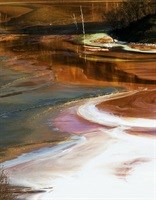
Top stories






More news















Unauthorised discharge of polluted water from the fertilizer production plant into the Selati River between 30 December 2013 and 5 January 2014 resulted in immediate acute toxicity evidenced resulting in a massive fish kill.
The Department of Water Affairs (DWA), Department of Environmental Affairs (DEA) and SANParks are continuing to cooperate closely on both the operational responses and the investigation associated with this incident. Senior representatives from the DWA, DEA and SANParks met with the board of directors of Bosveld Phosphate last week. A number of immediate response actions are being developed and technical task teams have now been established to deal with both short-term and longer-term threats and risks. On Thursday morning a new spillage was observed by SANParks personnel which drained into the Selati River.
Relatively stable weather has been predicted for the next two weeks by the SA Weather Services. This will enable the implementation of the immediate response measures by Bosveld Phosphate to alleviate the threat of further spillages. However, SANParks is concerned that industry is not adapting fast enough to climate variability in their risk management approaches and that further incidents of this nature may become more frequent.
Reacting to the new developments Dr. Stefanie Freitag-Ronaldson said that sincere commitment needs to be shown by Bosveld Phosphate to address the new spillage and its effects as well as to ensure that no further spillages occur. "Real urgency is required from Bosveld Phosphate's board and management and the team needs to move fast to avoid a catastrophic ecological disaster," said Freitag-Ronaldson.
The Olifants River is an important river for the economies of South Africa and Mozambique and as a result is highly pressurised. It is also a very important component of the ecosystem of the Kruger National Park. In recent years this river has shown signs of chronic ecological degradation including the disease and death of top aquatic predators such as crocodiles.
Three tourist camps in the Kruger National Park, usually supplied with water from the Olifants River, continue to be supplied by safe potable water from nearby boreholes. A detailed monitoring programme has been implemented by SANParks to evaluate the short, medium and long term impact of these spillages on the aquatic ecosystem.